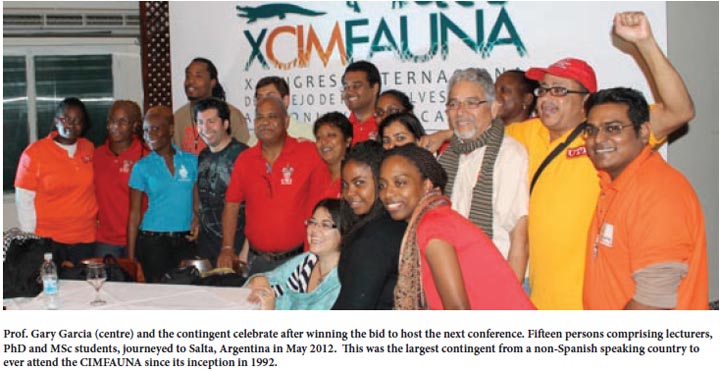 |
 |
 |
|
September 2012 |
Trinbagonians are connoisseurs of wild meat: agouti, lappe, wild hog, deer, manicou. It matters not the price; which ranges from $40 per pound for agouti to up to $150 per pound for wild hog. Trinidad and Tobago’s population looks forward to the hunting season (October to February) every year to acquire their portion of wild meat. Hunter return cards for 2010 to 2011 at the Forestry Division indicate that over 7,167 agouti, 2,797 lappe, 1,193 wild hogs and 3,081 deer were harvested from our forests. The figures are unsustainably high. Even the hunters complain that it takes longer to catch an animal and they have to go further into the forests to do so. On September 8, Minister of Environment and Water Resources, Ganga Singh, revealed that the reported overall figure for the past year was 20,000, but said this was more realistically around 50,000. The Minister noted that these were unacceptably high figures that threatened the ecological balance of the islands and recommended that we look towards neighbours like Guyana as possible sources for importing the popular meat. There are other options as well. Professor Gary Garcia, a Livestock Production Specialist in the Department of Food Production at UWI’s Faculty of Food and Agriculture, has been rearing and encouraging the rearing of wildlife since 1994. He has had the foresight to initiate research and collaboration with several local wildlife farmers and neo-tropical countries in Latin America to share and discuss information on some of the animal species indigenous to this region. He and 10 of his graduate students, together with four UTT staff and students, attended the 10th Conference on Amazonian Wildlife [XCIMFAUNA] in Salta, Argentina recently. CIMFAUNA is the International Congress on the Management of Amazonian and Latin American Wildlife, which was organized to help advance and improve the management of wildlife or neo-tropical animals (non-domesticated animals of the New World: Central America, South America and the Caribbean). This is the only conference of its kind in the world which focuses solely on neo-tropical animals. Progress in wildlife management has been made through a variety of initiatives that focused attention on studies and management programmes that integrated information on wildlife populations with the socio-economic human population around them, recipients of direct wildlife resource use, in order to benefit from the lessons learned, evaluating the achievements and constraints encountered in developing them.
This year, the organizing committee approved the unanimous recommendation for Trinidad and Tobago to host the XICIMFAUNA in August 2014. The XICIMFAUNA will be hosted by The UWI, under the new Faculty of Food and Agriculture in collaboration with UTT as well as other stakeholders. |


